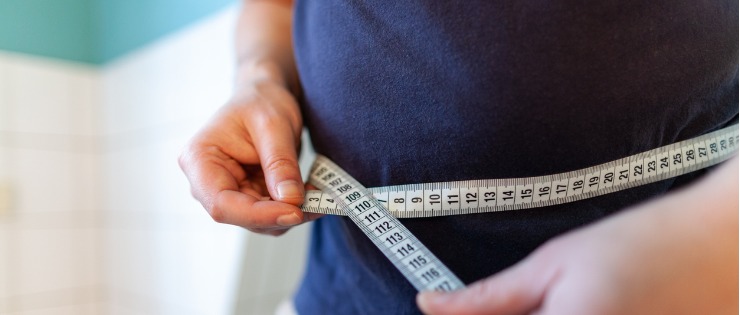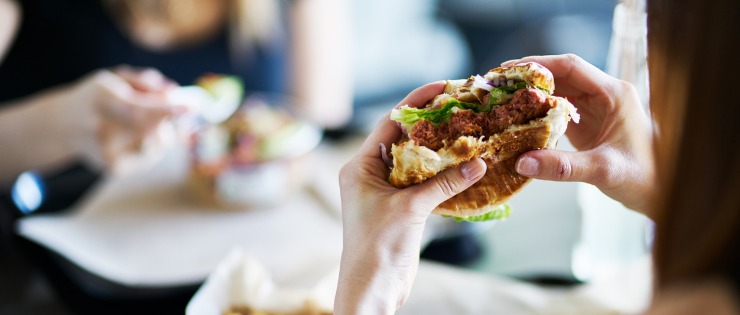
Most of us have reached for a tub of ice cream when we’re down or a bag of chips to feel better after a stressful day. The motivation for eating wasn’t to satisfy hunger but for comfort and stress relief.
What is Stress Eating?
Stress eating or emotional eating is when you consume foods when you’re not hungry but in response to your feelings. The causes of emotional eating can be physical and psychological. For some, stress eating occurs occasionally, but for others, it's regularly.
What Triggers Stress Eating?
Everyone’s reason for stress eating is personal. There’s a range of reasons that people can point to as the main one for causing their emotional eating. Often, it’s multiple factors that cause a person to eat emotionally.
Stress
The most common reason is stress (hence the name) and it has a physiological reason. When we’re stressed, our bodies release cortisol which triggers cravings for salt, fat and sugar.

A study of 5,000 adults in 2012 found that obesity was associated with stress-related eating in women but not in men. (Men are more likely to smoke or use alcohol instead of food). A British study found that people who produce high cortisol levels during times of stress are more likely to snack than people with low cortisol levels.
Boredom
It’s not just kids who look in the fridge and pantry when they’re bored; lonely adults do it too. Eating not only gives us something to do but also fills the empty void.
Childhood Influence
From a young age, some parents reward their kids with food treats for good behaviour, a great game of sport, or marks on a school report. What we don’t realise is we’re pre-programming our child’s brain to associate food with a reward which carries over into their adult life. As adults, we want to reward ourselves after a hard day’s work with a treat – food or alcohol.

Emotions
When we’re feeling anxious, anger, resentment or shame we might reach for food to mask the emotion.
It’s not a big problem if you use food to reward yourself, feel better or improve your mood on the odd occasion, it’s when comfort eating is a first impulse that it’s a problem.
Impact of Stress Eating on Your Health
The most obvious problem with emotional (over) eating is the unwanted weight gain and obesity. Many chronic illnesses such as cancer, stroke, hypertension, diabetes and high blood pressure are linked to obesity. One study has linked chronic life stress to weight gain, particularly in men. More research is being conducted into how stress may be linked to neurotransmitters and hormones that control appetite.

Emotional eating in some people is because of anxiety or depression. When a person feels guilty and out of control about their emotional eating, it’s likely to impact on their mental health.
If emotional eating is left untreated, it can develop into food addiction where a person becomes dependent upon the “good” feelings they get from consuming certain foods.
How to Stop Stress Eating
Stress eating can become a habit and habits are often hard to break.
The Cycle of Stress Eating
Stress eating can become a problem. It might be that we only stress eat every so often, but the same reason crops up again, and our brain remembers how we dealt with it last time, so being creatures of habit we do the same again!
Stress eating can become a constant cycle:
- An event or events occur that makes you feel stressed, down, upset or you’re just bored
- The event gives you an overwhelming urge to eat
- You eat more food (or unhealthy junk food) than you’d like
- Soon after you feel guilty

Before you know it, there’s another trigger and the cycle begins again making you feel helpless and at the mercy of food. Stress eating becomes a problem when a person feels they’re no longer in control of their health. But with willpower, it’s possible to learn to use other coping mechanisms to break the cycle.
Ask Yourself if You’re Hungry Physically or Mentally
Some people mistake their emotional hunger as physical hunger. But emotional hunger comes from the head, not the stomach such as a growling or rumbling stomach. Emotional hunger comes on quick, making a person feel as though they need to eat urgently.
An emotional eater will often crave a particular type of food, often junk food, because they are thinking of the textures, taste and smell the foods provide. With physical hunger, the food type is less important because you’re more interested in satisfying the growling stomach.

An emotional eater often engages in mindless eating where they don’t pay attention to the food or enjoy what they’re eating. Something else like the TV or their phone distracts them and they don’t realise how much they’ve eaten.
The body’s usual mechanism that tells you when you’re full doesn’t work as well when your emotional eating. If you were eating to satisfy physical hunger, you would no doubt stop eating much earlier.
Stress eating often causes feelings of shame, regret and low self-esteem. The person feels they gave in to cravings and poor willpower and consumed needless calories that can ultimately damage their health. They know they weren’t eating to satisfy a dietary need.
Keep a Diary
Some habits become so entrenched we don’t even realise we’re doing them or how often until we write it down. When you feel yourself wanting to emotionally eat, think about what the trigger may have been. Write in a diary how you felt, what the event was that made you feel like that and what you ate. With time, it may be clear what your triggers are and how much you’re overeating to combat them.

Replace Stress Eating with Something Else
Sometimes it can be easier to break a habit by replacing it with another that’s less damaging.
Reward Yourself
Decide that you won’t use food or drink as a reward any more and decide what your new reward will be. Your new reward could be enjoying a bath, spending time watching Netflix or browsing online. Whatever you enjoy doing, think of that as your new reward.
Exercise
If you are keen to shake the habit of overeating and want to lose weight, swap eating with exercise. It’s a powerful antidote because physical activity releases dopamine which makes us feel better, so you’re overcoming the low mood you may have felt and you’re taking on a new healthy habit.
Overcome Loneliness
If you know your emotional eating is linked to feelings of loneliness or depression, decide on some activities you can do to fill the gap. Calling a friend or family member might be enough for the feeling to pass, have a book ready to read or take up a hobby you can do whenever you’re feeling bored. Fill your day with activity, so you’re less inclined to fill your stomach.
Stop and Wait
Once you’ve recognised your triggers and know you’re at risk of stress eating, decide to always wait a little while before you eat. This gives you time to decide if you’re actually hungry or your mind is playing tricks. While you’re waiting, keep yourself busy with another activity and see if the craving disappears.
Make Healthier Choices
While you’re working on breaking the cycle of emotional eating, make it harder to find the foods you crave. Foods high in fat and sugar are considered comfort foods because they reduce stress related responses and emotions. Clear the house of the salty, sweet foods you like to eat and tell yourself you can only eat healthy options. Cut up vegetable sticks or fruit and keep it in the fridge so when the craving strikes, this is the most convenient (and only) snack option. With time, your brain will realise that the unhealthy options are no longer available.

When you’re eating, slow down and focus on the food. Don’t multitask by reading or watching TV while you eat so you’re more aware of your body’s cues telling you you’re full.
Seek Professional Help
Emotional eating is one of several eating disorders people suffer from. Many don’t overcome their disorder without professional help.
For some, there are no strategies that will allow them to break the cycle of emotional eating until they gain help for their triggers. People who suffer from severe depression, anxiety or stress may need to see a professional to gain help before they have success with reducing their emotional eating.
If you have an eating disorder or suffering from stress, see your GP and if required ask for a referral to a specialist.